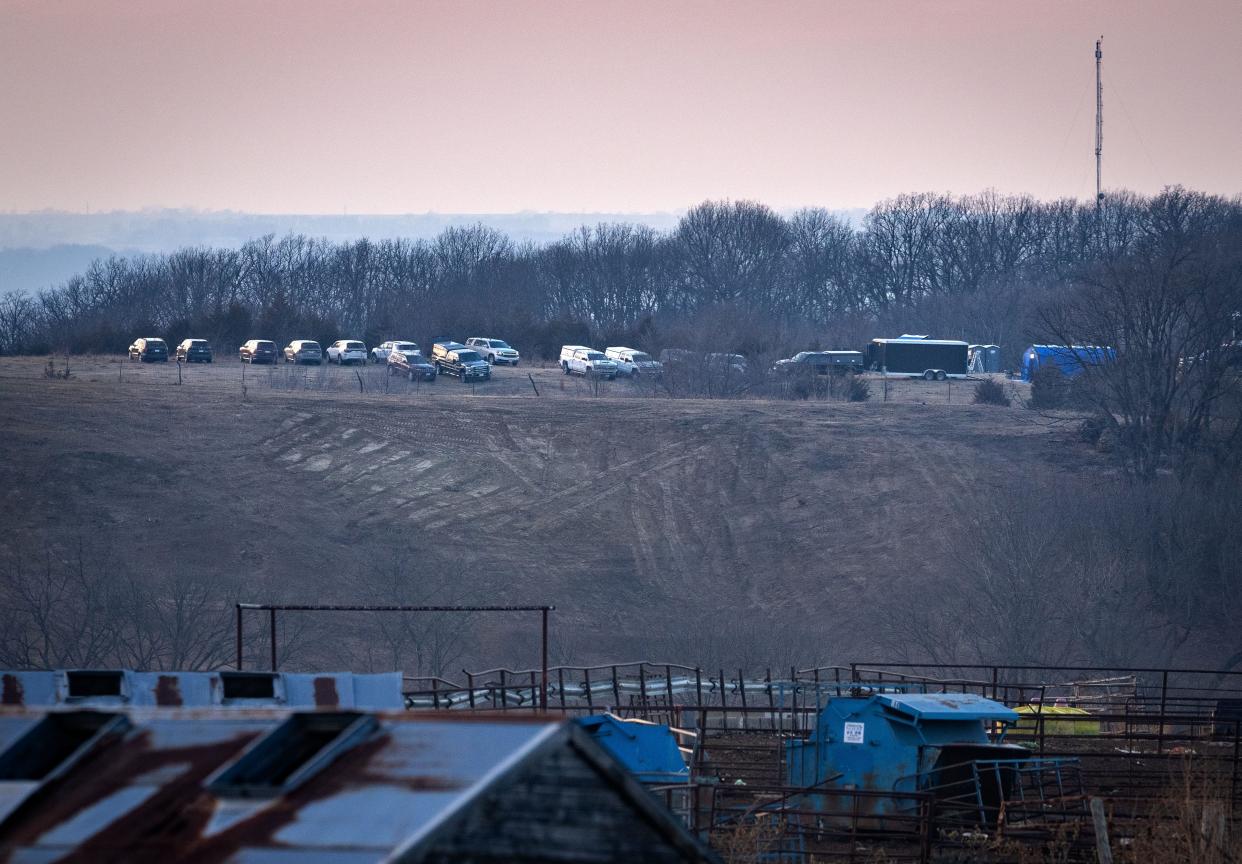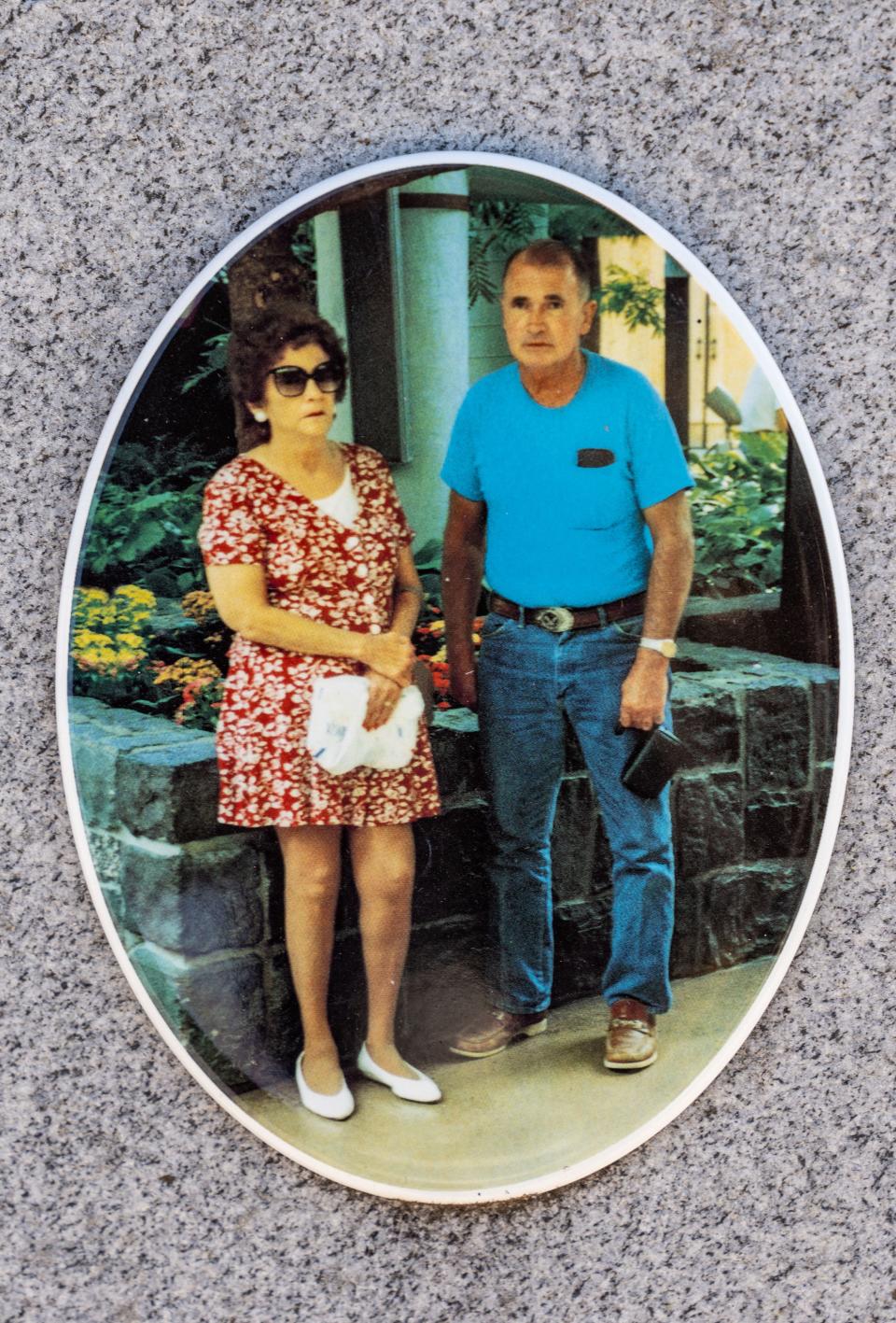Search of alleged serial killer's land turns up no evidence; daughter says she'll take a polygraph

A woman who alleges her late father was a prolific Iowa serial killer said Friday she's frustrated a law enforcement team spent just two days this week digging and testing soil before declaring it found no evidence to support her claim that he had used the area behind the family's home to bury victims.
Lucy Studey McKiddy, of Lakeland, Florida, stuck by her assertion that her late father, Donald Dean Studey, murdered "five or six" women a year over several decades and buried them in and around an abandoned well on the site near Thurman, about 40 miles from Omaha, Nebraska. Studey died at age 75 in 2013.
McKiddy said she is willing to take a lie detector test to prove she's telling the truth.
But Mitch Mortvedt, a spokesperson for the Iowa Division of Criminal Investigation, said the team, which included anthropology and crime scene evidence recovery experts, went to the exact GPS locations and well that McKiddy told authorities to search, and found nothing.
DCI and FBI agents joined sheriff's deputies at the remote, 425-acre area behind Studey's former home near Thurman in southwest Iowa's Fremont County. The DCI announced in a news release late Thursday that the "exhaustive" search had been called off after investigators found no evidence or "items of concern." It said the team was at the site over three days.
More:What we know about the alleged Iowa serial killer Donald Studey, investigation in Thurman
Even so, McKiddy, 53, one of four children of Studey, told the Des Moines Register on Friday she would keep trying to have her claims investigated until she dies.
"One way or another, those bodies are coming up," she said. "With or without help."
McKiddy also said she showed up Oct. 2 for a polygraph test scheduled by FBI agent John Herman in Lakeland, but was turned away.
The FBI has not responded to messages seeking comment on the case.
Serial killer allegations draw wide attention
McKiddy's claims made international news after Newsweek reported two cadaver dogs registered "hits" at the site in late October, indicating the possible presence of decomposing remains in the area near the well.
Mortvedt said late Friday afternoon that he checked this week with the DCI team on a new report by Newsweek, which cited no named source, that a third cadaver dog taken to the site had a similar reaction. "They knew nothing about that," he said.
Studey said her previous attempts to report her father’s killings over the years had been ignored by teachers, counselors, clergy and law enforcement officials in both Iowa and Nebraska.
"I now understand how my dad got away with it," she told the Register. "For decades I've had nothing but disappointment from authorities."
More:From John Wayne Gacy to the 'I-65 Killer,' how these 11 serial killers are connected to Iowa
In Thurman, where locals long avoided the wooded hollow north of town, McKiddy's allegations that Studey could have been a serial killer generated lots of gossip and made some shudder. Longtime residents told the Register they were not surprised to hear that the local recluse, who was the subject of numerous law enforcement calls before he died, had been accused by his own daughter of killing scores of people. Sheriff's reports showed he had threatened others over the years, including his live-in girlfriend, and that he was sometimes suicidal, once shooting himself in the arm in the presence of deputies.
But others expressed doubts about the accusations by McKiddy, whose account shifted over time.
Chief Deputy Timothy Bothwell said the Fremont County Sheriff's Office first heard the allegations in 2007, when Studey claimed his daughter had stolen $16,000 from him. McKiddy, Bothwell said, denied she took the money but alleged her father had buried bodies in the disused well on the former site of a county-run home for the poor.
Bothwell said he was unable to find the well she described, and the investigation stalled. He also doubted her credibility, he said. She later admitted, as he suspected, that she had taken the money, and “we thought she was just trying to get dad in trouble or have us look at him because she stole his money."
Speaking in 2021 with another deputy, McKiddy claimed a second time that her father had killed several people and that she believed he disposed of their bodies in the well. In that phone interview, she described instances when she had seen bodies on the property and helped her father put lye in the well, apparently to speed their decomposition.
But another of Studey’s four children, Susan Studey, subsequently told Newsweek that McKiddy was not telling the truth. She said her father was strict but not a serial killer, and she wanted to restore his name. The Register could not locate a third Studey daughter. A brother, Gary Studey, died in 2004.
According to a sheriff's 2021 investigative report, McKiddy told deputies she knew of five bodies in the well and had heard stories that there were up to 15. But Newsweek reported in an online story Oct. 22 that in a subsequent interview with reporters from the magazine, she said there were 50 to 70.
Kevin Aistrope, sheriff for 14 years in Fremont County, said that despite the inconsistencies, he had no choice but to push for further investigation, especially after the reactions of the cadaver dogs in October supported McKiddy's claims.
On Friday, Aistrope was out of the office and could not be reached for comment.

More:From John Wayne Gacy to the 'I-65 Killer,' how these 11 serial killers are connected to Iowa
Donald Studey didn’t have a criminal record in Iowa. But McKiddy insisted her father was a crook and a gambler most of his life. She said he picked up people, mostly women and transients, near the Omaha-Council Bluffs metro, and that some of the women came to live with the family for a while.
“He stole from every job he ever had,” she told Watchdog in an interview. “He ran drugs, guns and (dealt) in stolen property. He got jobs only when he needed to."
She told Bothwell last year she also had seen her father dispose of the bodies of some men.
In an interview with CNN's Anderson Cooper in late October, Naveed Jamali, a Newsweek editor at large working on the story, said the staff had established evidence that Studey was a gambler who lived a life of crime.
That alone didn't make him a serial killer, he acknowledged. However, in "speaking to people," Jamali said, reporters also discovered "a pattern" suggesting Studey "may have been connected to a criminal ring and potentially organized crime."
Lee Rood's Reader's Watchdog column helps Iowans get answers and accountability from public officials, the justice system, businesses and nonprofits. Reach her at lrood@registermedia.com, at 515-284-8549, on Twitter at @leerood or on Facebook at Facebook.com/readerswatchdog.
This article originally appeared on Des Moines Register: Search of alleged Iowa serial killer's land turns up no evidence

